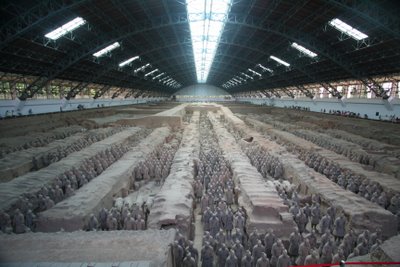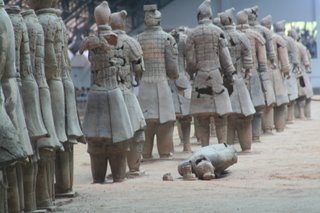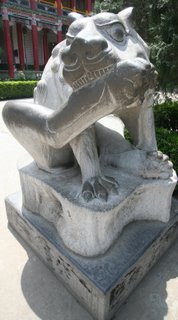You Can't Take It With You, Or Can You?

What do Zhou, Qin, Tang, Yuan, Shang, Han and Ming all have in common? For starters, I cannot pronounce any of the names correctly. But aside from that familiar hurdle for westerners, the listed names belong to dynastyic families who ruled China as early as the 10th century B.C., that's one thousand years before Christmas even existed (imagine those poor b.c. kids with no tree or Santa Claus). And another link between the dynasties for this unacademic entry is that none of them exist today, but not without leaving their respective marks.
Yes, China's thriving tourism industry owes many thanks to its dynastic families of the past as bus, boat and plane loads of tourists flock to the ancient relics throughout the country. Fortunatley, Mao's Cultural Revolution did not destroy every artifact connected with China's long, tattered history. Today, the State Bureau of Cultural Relics manages the remaining sites of historic significance.
Ranked the second most popular tourist sight in China, the terracotta soldiers found in Xi'an (pronounced "Shee An") draw thousands of visitors each day. Before buddhism existed, it was widely believed (similar to the Egyptians) that the deceased would be able to those items (money, jewelery, books, clothes, etc) with which they were buried. During the early Qin Dynasty, the concept was taken one step further, and the servants, concubines and slaves were buried alive with the corpse (hold your breath, the trip to heaven may take awhile, we're not really sure how long at this point).
Three hundred years later (209 B.C.), Emperor Qin would modify this dramatic and some would say, breathtaking practice. More than 7,000 strong, a terracotta replica of his army was fabricated by hand, including horses and chariots (short on skilled assembly line workers in those days). Mind you, each and every one of these soldiers is made identical to an actual live soldier at the time. There were no molds. The statutes vary in height, width, hair style, military rank, weapon and facial features. All in all an amazing feat performed at the behest of an Emperor's superstitious belief.

After his death in 210 B.C., the clay infantry soldiers were placed below ground, facing East, 1.5 kilometers from his tomb. Generals and other officers were given separate sub-surface chambers nearby. You might be asking, "Why all the pomp, cicumstance and fuss?" To protect the emperor in the after life of course.
 (The new massive undertaking, putting 7,000 "Humpty Dumpty's" back together again is expected to take as long as 100 years - guess my grandkids can compare my pictures when it is completed. Each night at 8 p.m., the arduous process of reassembling the soldiers resumes through the night)
(The new massive undertaking, putting 7,000 "Humpty Dumpty's" back together again is expected to take as long as 100 years - guess my grandkids can compare my pictures when it is completed. Each night at 8 p.m., the arduous process of reassembling the soldiers resumes through the night) From where did these after death beliefs come? Why were they similar to the Egyptian's beliefs, a vastly different culture thousands of miles away? Why is the Emperor's tomb buried in a pyramid-like mound of dirt? Was there a shooter on the grassy knoll? Those are the questions my inquiring mind wants to know.
We may never know the answers to such questions, but today, the Chinese culture is brimming with what might be characterized as "superstitious" beliefs. In each temple you visit, there is a lion, dragon or phoenix to rub for good luck or health or fortune or long life or happiness. Superstitions don't stop at the temple doors either.
 (Rubbing each part of this dragon brings a specific benefit. I rubbed them all just to cover my bases.) From drinking Oolong Tea for a healthy mind to Black Tea for a warm stomach, there is a laundry list of each food's benefit beyond culinary delight and sustenance. Ironically, many of the men smoke like chimneys, drink heavily and eat fried food virtually every meal, but take great care to rub a statute or two for longevity or good health.
(Rubbing each part of this dragon brings a specific benefit. I rubbed them all just to cover my bases.) From drinking Oolong Tea for a healthy mind to Black Tea for a warm stomach, there is a laundry list of each food's benefit beyond culinary delight and sustenance. Ironically, many of the men smoke like chimneys, drink heavily and eat fried food virtually every meal, but take great care to rub a statute or two for longevity or good health.So it goes that the foreign companies who sell successfully in China will be those that best learn to adapt their marketing and advertising strategies to the cultural appetite for deeper long lasting benefits to an individual's overall well being and/or success. You might sell a Mustang to an American based on performance and speed, but in China, there is a different hot button perhaps involving renaming the car to "Phoenix" (symbol of power and virtue for Chinese) and changing the hood ornament to a symbol for "Happiness" or "Strength". The companies that do not tune into the cultural nuances might as well bury their heads and join the Qin Dynasty's terracotta soldiers. Nevertheless, if for someone reason you should be around for my burial, please include lots of dark chocolate! (Even cremation because then I would be closer to Smores than ever.)


<< Home